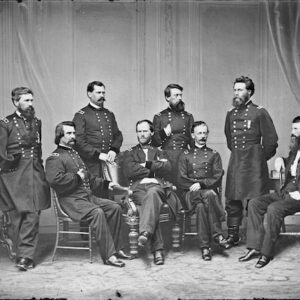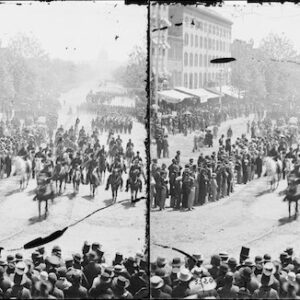Tag: Blair (Francis P. Jr.)
 Wikipedia says: Francis Preston Blair Jr. (February 19, 1821 – July 8, 1875) was an American jurist, politician and soldier. He represented Missouri in both the House of Representatives and the Senate, and was active in preventing the State of Missouri from being absorbed into the Confederacy at the beginning of the Civil War.
Wikipedia says: Francis Preston Blair Jr. (February 19, 1821 – July 8, 1875) was an American jurist, politician and soldier. He represented Missouri in both the House of Representatives and the Senate, and was active in preventing the State of Missouri from being absorbed into the Confederacy at the beginning of the Civil War.
Blair was instrumental in appointing Nathaniel Lyon as the new military commander of the Western Department of the U.S. Army. He assisted Lyon in securing help of the St. Louis Home Guard in moving over 20,000 rifles and muskets from the St. Louis Arsenal to Illinois. Missouri secessionists considered this event as breaking of informal truce established in the state. This set the scene for the Camp Jackson Affair and continuing guerrilla activity by outraged pro-slavery elements. In 1862, Blair joined the Missouri volunteers, being promoted major general, commanded a division at Vicksburg under Sherman, took part in Sherman’s March to the Sea and ended the war as a corps commander.
In 1868, he was Horatio Seymour’s vice-presidential candidate, but his dramatic speeches about the dangers of black emancipation were believed by some to have cost the Democrats the election. Blair suffered a paralyzing stroke in 1872, but continued to be active in state politics until his death.
…Immediately after South Carolina’s secession in December 1860, Blair, believing that the southern leaders were planning to carry Missouri into the movement, began active efforts to prevent it. He personally organized and equipped a force of several thousand strong Home Guard, drawn from the Wide Awakes, the Republican marching clubs of the 1860 presidential campaign, and the members of the German gymnastic movement in St. Louis, Turnverein. When tensions rose, Blair and Captain (later brigadier general) Nathaniel Lyon suddenly transferred the arms in the U.S. Arsenal at St. Louis to Alton, Illinois. On May 10, 1861, Lyon, with the Home Guards and a U.S. regular Army company, captured several hundred secessionist state militia which had been positioned to seize the Arsenal. The Camp Jackson Affair gave the Federal cause a decisive initial advantage in Missouri but also inflamed secessionist sentiments in the state.
Open warfare between Union forces and the followers of pro-Southern Missouri governor Claiborne Jackson was imminent. To avoid this, General William S. Harney, the Army commander in Missouri, agreed to the Price-Harney Truce with Missouri State Guard commander Sterling Price on 21 May.
Blair objected, and contacted Republican leaders in Washington. Within a few weeks, Harney was replaced by Lyon as temporary commander. Lyon drove Jackson and Price to the southwestern corner of Missouri before he was killed at the Battle of Wilson’s Creek, while Blair helped organize a new all-Unionist state government, and John C. Frémont took over as the U.S. Army Western Department commander.
Frémont was himself a prominent Republican with Missouri connections. Blair soon came to regard Frémont as a political rival, and they clashed over many aspects of Frémont’s operations in Missouri. Frémont as the regional Army commander was responsible for spending a lot of money in a great hurry for supplies and equipment. Blair expected most of this money to go his allies in the St. Louis business community, but Frémont and his staff had their own ideas. Blair’s bitter complaints, added to the waste and corruption, helped discredit Frémont, who was replaced on November 2.
Blair was appointed a colonel of Missouri volunteers in July 1862. He was promoted brigadier general of volunteers in August 1862 and then to major general in November. After winning re-election to the House of Representatives, Blair supposedly resigned from his seat order to lead troops on November 29, 1862, but he never formally submitted his resignation.
In Missouri, Blair commanded a brigade consisting of the 13th Illinois Infantry, the 29th, 30th, 31st, and 32nd Missouri Infantry, the 58th Ohio Infantry, 4th Company, Ohio Light Artillery, and Company C, 10th Missouri Cavalry.
Blair subsequently commanded a division in the Vicksburg campaign and in the fighting about Chattanooga, and was one of William T. Sherman’s corps commanders in the final campaigns in Georgia and the Carolinas. His XVII Corps was engaged protecting the rear areas of Sherman’s army until later in the Atlanta Campaign. Before it left on the March to the Sea, XVII Corps absorbed part of the detachment of XVI Corps that had served with Sherman.
Showing all 2 results

